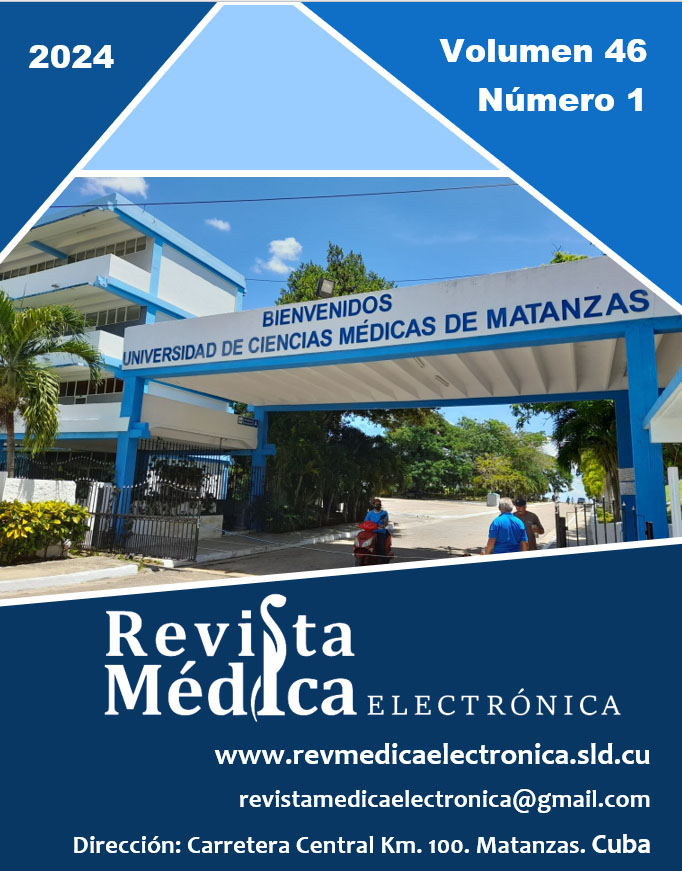Hegemonic masculinity: negative factor in the prevention of sickle cell anemia in Matanzas
Keywords:
sickle cell disease, hegemonic masculinity, prenatal diagnosis, prevention, genetic counselingAbstract
Introduction: In Cuba, great importance is given to the care of mother and child, which is why programs are develop to prevent diseases such as sickle cell anemia, hereditary condition very frequent in the world. Genetic counseling of this disease reveals hegemonic masculinity traits inherited from a patriarchal culture, which conspire against prenatal diagnosis of the disease.
Objective: To describe the patterns of hegemonic masculinity which negatively affect the prevention of sickle cell anemia in the province of Matanzas.
Methods: A retrospective descriptive research was carried out, through the review of sickle cell anemia clinical records of the Medical Genetics Department of Matanzas, from 1981 to 2021.This genetic record was computerized in Excel and the information was examined. The number of husbands of carrying pregnant women who refused hemoglobin electrophoresis was analyzed, as well as the number of couples denied to prenatal diagnosis and the causes in both cases. A percentaje analysis was performed, presented in tables.
Results: 7140 husbands of pregnant women carrying sickle cell anemia were studied; those who refused hemoglobin electrophoresis constituted 1088 due to non-acceptance of paternity and morbimortality for this disease. Of 428 risk couples, 252 were prenatally diagnosed; 78.9% of those 176 not studied corresponded to male denial, where fear of abortion, dissatisfaction with morbimortality, and irresponsible paternity traits prevailed.
Conclusions: Patterns of hegemonic masculinity are negatively manifested in genetic counseling for sickle cell disease. Dismantling them progressively helps to improve the prevention of this disease through prenatal diagnosis.
Downloads
References
2. Luna López AE, Concepción Yero B, Yero Muro LB, et al. Prevalencia de las hemoglobinopatías en gestantes de la provincia de Sancti Spiritus. Univ Méd Pinareña [Internet]. 2020 [citado 04/02/2023];16(3):e558. Disponible en: http://revgaleno.sld.cu/index.php/ump/article/view/558/pdf
3. Cuadra Brown YA, Hechevarria Stenoz D, Céspedes Quevedo MC, et al. Impacto del diagnóstico prenatal del Programa Nacional para la Prevención de Anemia falciforme en la incidencia de hemoglobinopatías en Santiago de Cuba. Medisan [Internet]. 2022 [citado 08/01/2023];26(4). Disponible en: http://scielo.sld.cu/scielo.php?script=sci_arttext&pid=S1029-30192022000400007
4. Marcheco Teruel B. Impacto del programa de prevención de anemia por hematíes falciformes en Cuba: 1982-2016. Anales de la Academia de Ciencias de Cuba [Internet]. 2018 [citado 12/12/2022];8(1). Disponible en: http://revistaccuba.sld.cu/index.php/revacc/article/view/440
5. Valdés Fracer Y, Pérez Rodríguez J, Concepción Álvarez A, et al. Frecuencia de hemoglobinopatías en mujeres embarazadas del programa de anemias por hematíes falciformes en Cuba. Rev Cubana Hematol Inmunol Hemoter [Internet]. 2021 [citado 25/06/2022];37(1):e1338. Disponible en: http://www.revhematologia.sld.cu/index.php/hih/article/view/1338/1099
6. Rodríguez del Pino JA, Jabbaz Churba M. Deconstruyendo machos, construyendo personas. Relatos de alejamiento de la masculinidad hegemónica en España. Rev Estud Soc [Internet]. 2022 [citado 12/02/2022];(79):108-24. Disponible en: https://journals.openedition.org/revestudsoc/51453
7. Rivero Pino R. Masculinidades hegemónicas y Genética. Rev Cubana Genét [Internet]. 2018 [citado 12/12/2022];12(1). Disponible en: https://revgenetica.sld.cu/index.php/gen/article/view/9/2
8. Svarch E, Machín García SA. Epidemiología de la drepanocitosis en países de América Latina y del Caribe. Rev Cubana Hematol Inmunol Hemoter [Internet]. 2020 [citado 04/02/2022];36(2). Disponible en: http://scielo.sld.cu/scielo.php?pid=S0864-02892020000200002&script=sci_arttext
9. Asamblea Nacional del Poder Popular de Cuba. Código de las Familias. Gaceta Oficial de la República de Cuba. Ley 156/2022. No 99. La Habana: Asamblea Nacional del Poder Popular de Cuba; 2022.
10. Connell RW, Messerschmidt JW. Masculinidade hegemônica: repensando o conceito. Rev Estud Fem. 2013;21(1):241-82. DOI: 10.1590/S0104-026X2013000100014.
11. Rivero Pino R, Suárez Besil B, Benítez Cordero Y. Masculinidad hegemónica en pacientes con enfermedades crónicas frecuentes en Cuba. Rev Cubana Genét [Internet]. 2018 [citado 12/12/2022];12(1). Disponible en: https://revgenetica.sld.cu/index.php/gen/article/view/15
12. Arés Muzio P. Masculinidad hegemónica. Su impacto en la salud psicológica, la pareja, la paternidad y la familia. En Díaz Álvarez MT, Rivero Pino R, Torres Rodríguez B, et al. Primer Consenso Cubano sobre Salud Masculina y Masculinidades [Internet]. La Habana: CENESEX; 2021 [citado 12/12/2022]. p. 110-7. Disponible en: http://cuba.unfpa.org/es/publications/primer-consenso-cubano-sobre-salud-masculina-y-masculinidades
13. Raena Triviño B. Desarmar la masculinidad. Los hombres ante la era del feminismo [Internet]. Madrid: Catarata; 2021 [citado 12/12/2022]. Disponible en: https://www.catarata.org/libro/desarmar-la-masculinidad_119381/
14. Messerschmidt JW. Hegemonic Masculinity: Formulation, Reformulation and Amplification [Internet]. Londres: Rowman & Littlefield; 2018 [citado 12/12/2022]. Disponible en: https://rowman.com/ISBN/9781538114056/Hegemonic-Masculinity-Formulation-Reformulation-and-Amplification
15. Martínez Perera A. La paternidad, visión desde una perspectiva biopsicosocial. Rev Cubana Genét [Internet]. 2018 [citado 12/12/2022];12(1). Disponible en: https://revgenetica.sld.cu/index.php/gen/article/view/11
Downloads
Published
How to Cite
Issue
Section
License
All content published in this journal is Open Access, distributed under the terms of the CC BY-NC 4.0 License.
It allows:
- Copy and redistribute published material in any medium or format.
- Adapt the content.
This will be done under the following terms:
- Attribute the authors' credits and indicate whether changes were made, in which case it must be in a reasonable way.
- Non-commercial use.
- Recognize the journal where it is published.
The copyrights of each article are maintained, without restrictions.






